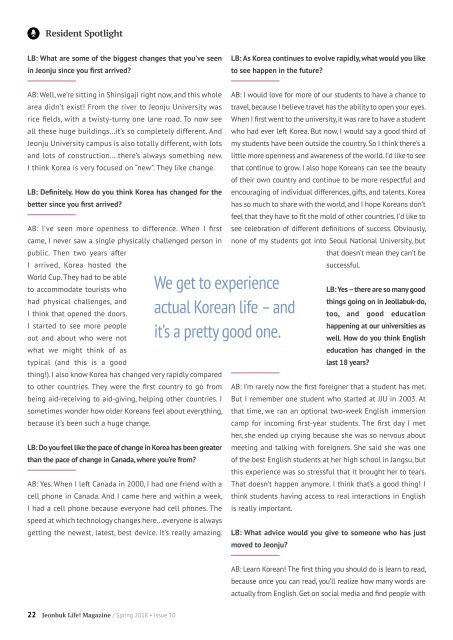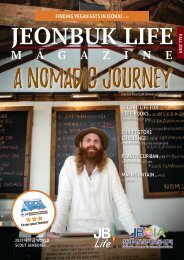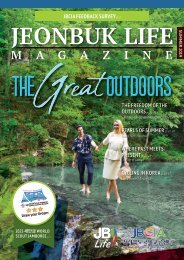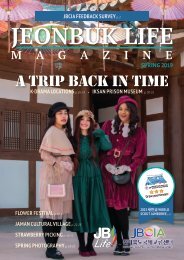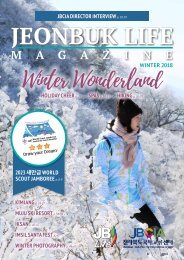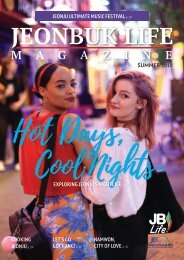You also want an ePaper? Increase the reach of your titles
YUMPU automatically turns print PDFs into web optimized ePapers that Google loves.
Resident Spotlight<br />
LB: What are some of the biggest changes that you’ve seen<br />
in Jeonju since you first arrived?<br />
LB: As Korea continues to evolve rapidly, what would you like<br />
to see happen in the future?<br />
AB: Well, we’re sitting in Shinsigaji right now, and this whole<br />
area didn’t exist! From the river to Jeonju University was<br />
rice fields, with a twisty-turny one lane road. To now see<br />
all these huge buildings…it’s so completely different. And<br />
Jeonju University campus is also totally different, with lots<br />
and lots of construction….there’s always something new.<br />
I think Korea is very focused on “new”. They like change.<br />
LB: Definitely. How do you think Korea has changed for the<br />
better since you first arrived?<br />
AB: I’ve seen more openness to difference. When I first<br />
came, I never saw a single physically challenged person in<br />
public. Then two years after<br />
I arrived, Korea hosted the<br />
World Cup. They had to be able<br />
to accommodate tourists who<br />
had physical challenges, and<br />
I think that opened the doors.<br />
I started to see more people<br />
out and about who were not<br />
what we might think of as<br />
typical (and this is a good<br />
thing!). I also know Korea has changed very rapidly compared<br />
to other countries. They were the first country to go from<br />
being aid-receiving to aid-giving, helping other countries. I<br />
sometimes wonder how older Koreans feel about everything,<br />
because it’s been such a huge change.<br />
LB: Do you feel like the pace of change in Korea has been greater<br />
than the pace of change in Canada, where you’re from?<br />
AB: Yes. When I left Canada in 2000, I had one friend with a<br />
cell phone in Canada. And I came here and within a week,<br />
I had a cell phone because everyone had cell phones. The<br />
speed at which technology changes here…everyone is always<br />
getting the newest, latest, best device. It’s really amazing.<br />
We get to experience<br />
actual Korean life – and<br />
it’s a pretty good one.<br />
AB: I would love for more of our students to have a chance to<br />
travel, because I believe travel has the ability to open your eyes.<br />
When I first went to the university, it was rare to have a student<br />
who had ever left Korea. But now, I would say a good third of<br />
my students have been outside the country. So I think there’s a<br />
little more openness and awareness of the world. I’d like to see<br />
that continue to grow. I also hope Koreans can see the beauty<br />
of their own country and continue to be more respectful and<br />
encouraging of individual differences, gifts, and talents. Korea<br />
has so much to share with the world, and I hope Koreans don’t<br />
feel that they have to fit the mold of other countries. I’d like to<br />
see celebration of different definitions of success. Obviously,<br />
none of my students got into Seoul National University, but<br />
that doesn’t mean they can’t be<br />
successful.<br />
LB: Yes – there are so many good<br />
things going on in Jeollabuk-do,<br />
too, and good education<br />
happening at our universities as<br />
well. How do you think English<br />
education has changed in the<br />
last 18 years?<br />
AB: I’m rarely now the first foreigner that a student has met.<br />
But I remember one student who started at JJU in 2003. At<br />
that time, we ran an optional two-week English immersion<br />
camp for incoming first-year students. The first day I met<br />
her, she ended up crying because she was so nervous about<br />
meeting and talking with foreigners. She said she was one<br />
of the best English students at her high school in Jangsu, but<br />
this experience was so stressful that it brought her to tears.<br />
That doesn’t happen anymore. I think that’s a good thing! I<br />
think students having access to real interactions in English<br />
is really important.<br />
LB: What advice would you give to someone who has just<br />
moved to Jeonju?<br />
AB: Learn Korean! The first thing you should do is learn to read,<br />
because once you can read, you’ll realize how many words are<br />
actually from English. Get on social media and find people with<br />
22 Jeonbuk Life! <strong>Magazine</strong> / <strong>Spring</strong> <strong>2018</strong> • Issue 10


